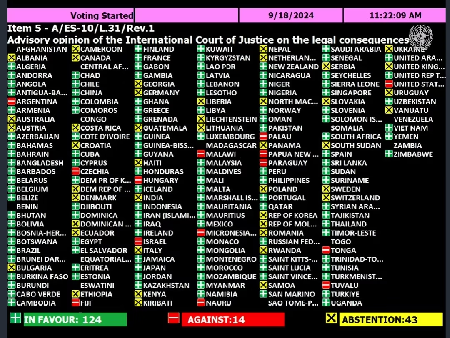UN General Assembly overwhelmingly calls for end of Israeli occupation
International body demands an end to Israel’s illegal presence in the Palestinian territories within 12 months.
The United Nations General Assembly (UNGA) has overwhelmingly adopted a resolution calling on Israel to end its illegal occupation of the Palestinian territories within a year, a move that Palestine hailed as “historic.”
The nonbinding measure passed a 124–14 vote on Wednesday, with 43 countries abstaining.
The UNGA demanded that “Israel brings to an end without delay its unlawful presence in the Occupied Palestinian Territory, which constitutes a wrongful act of a continuing character entailing its international responsibility, and do so no later than 12 months.”
It also called on Israel to make reparations to Palestinians for damages incurred by the occupation.
The UNGA, whose mission includes promoting “respect for human rights and fundamental freedoms”, includes every sovereign country in the world, so Wednesday’s vote underscores the depth of the international opposition to the Israeli occupation of Palestine.
The resolution backed an advisory opinion by the International Court of Justice (ICJ)—the UN’s top court—which found that Israel’s presence in the Palestinian territories is unlawful and must end.
The court ruled in July that Israel is abusing its status as an occupying power, stressing that Israeli settlements in the West Bank and East Jerusalem are illegal.
The UNGA vote comes amid Israel’s devastating war on Gaza, which has killed more than 41,250 Palestinians. The ICJ has issued rulings ordering Israel to take steps to prevent genocide in Gaza and allow adequate humanitarian aid into the territory.
The United States, which claims to pursue a two-state solution to the conflict, joined Israel in opposing the UNGA resolution on Wednesday – as did Czechia, Hungary, Argentina and several small Pacific island states.
The resolution was submitted by Palestine – a permanent observer state at the UN.
Palestinian Authority President Mahmoud Abbas welcomed the resolution and urged countries across the world to take steps to pressure Israel to adhere to it.
“The international consensus over this resolution renews the hopes of our Palestinian people – who are facing a comprehensive aggression and genocide in Gaza and the West Bank, including Jerusalem – to achieve its aspirations of freedom and independence and establishing a Palestinian state with East Jerusalem as its capital,” Abbas said.
Origins of the occupation
Israel captured the West Bank, Gaza and East Jerusalem in the 1967 war and subsequently annexed the entire holy city in 1980.
International law prohibits the acquisition of land by force.
Israel has also been building settlements – now home to hundreds of thousands of Israelis – in the West Bank in violation of the Fourth Geneva Convention, which bans the occupying power from transferring “parts of its own civilian population into the territory it occupies”.
Most of the international community considers the occupation illegal.
But the US argues that Palestinians and Israelis should negotiate a resolution to the issues without external pressure – a standard that Washington does not apply to other conflicts, including the Russian occupation of parts of Ukraine.
Several US allies – including France, Finland and Mexico – voted in favour of Wednesday’s resolution. The United Kingdom, Ukraine and Canada abstained.
Canadians for Justice and Peace in the Middle East, an advocacy group, slammed the abstention as “a cowardly refusal to stand up for international law and Palestinian freedom”.
“All states are obliged to help bring an end to Israel’s illegal occupation of the Palestinian territories as soon as possible, but Canada just abstained,” the group said in a social media post.
Download resolution A/ES-10/L.31/Rev.1
Photo on front page: Palestinians stand at the site of an Israeli attack on a shelter that housed displaced people in central Gaza on 17 August 2024. Source: Ramadan Abed/Reuters. Image on this page: Screen indicating the voting record on resolution. Source: UN.














